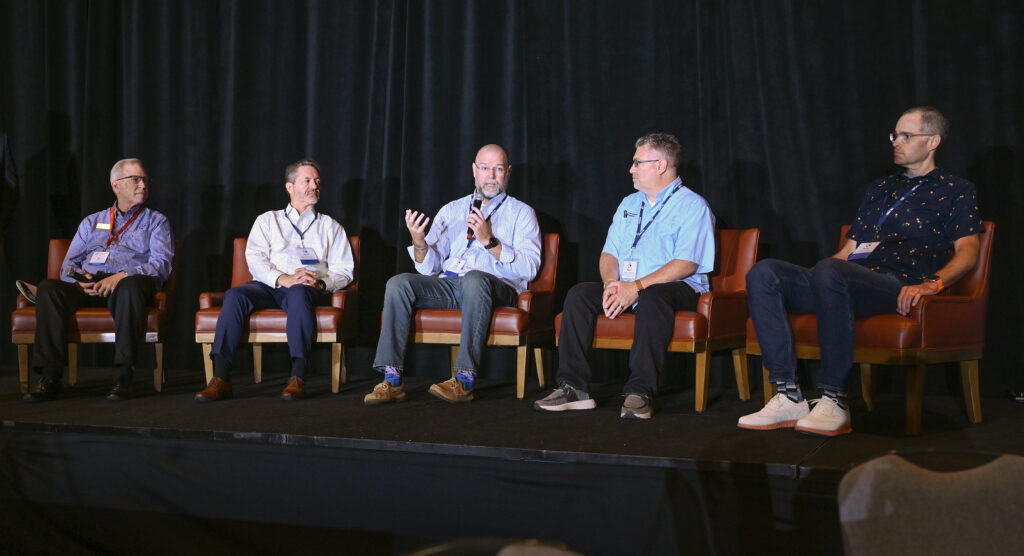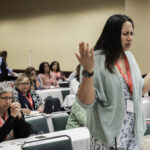
INDIANAPOLIS (BP) – Southern Baptist associational leaders concluded their two-day annual conference on Monday (June 10) with a roundtable discussion from experienced peers and a plenary session led by Mac Lake, CEO of the Multiply Group.
In addition, the Southern Baptist Conference of Associational Leaders (SBCAL) unanimously approved four constitution and bylaw changes. The amendments added a treasurer, updated priorities and extended the term of the executive team’s chair by a year, when he’ll serve on the administrative team.
SBCAL had unanimously passed a record budget and approved new leaders during an earlier business meeting the previous day. More than 400 associational leaders and their wives attended the conference during the two days.
Veteran associational leaders share wisdom with peers
A roundtable of experienced associational missions strategists (AMS) answered questions from their peers during the Monday morning session of the annual conference.
Attendees were given the opportunity to text their questions to Todd Robertson, executive director of the Louisville Regional Association and the outgoing executive team chair of SBCA. The questions were then given to the roundtable anonymously.
When asked about first-year priorities for new people to the AMS role, several leaders recommended focusing on relationship building.
“You need to spend a ton of time building relationships. That’s part of our DNA. That’s part of the responsibility of what we do,” said Steve Laughman of the Centennial Baptist Association in Georgia. “You don’t have enough change in your pocket to cast a vision on day one. You need to be thinking about vision, thinking about strategy, but the first year, just like many of us who have served as pastors before, is about building relationships.”
Another conference participant asked about how to handle churches that were no longer a part of the state convention or the Southern Baptist Convention. Brian Nall, executive director of the Pensacola Bay Baptist Association in Florida, said his association is currently reviewing their process of how they are doing this considering national discussions on what it means to be “in friendly cooperation.” He notes associations are autonomous organizations and have different requirements for affiliation.
“We want to make sure our polity reflects the partnership,” Nall said. “We love the local, we value the state, and we love what’s happening nationally, but let’s just make sure our policy and our mission are aligned.”
Laughman recommended balancing advocacy for the national and state conventions, while recognizing the historic role of associations.
“We kind of need to maintain that balance where we understand that our role is important regardless of what happens at the national or state level, while also being advocates for what they do because we understand the value of it,” Laughman said.
Conference attendees also asked questions about serving bi-vocational pastors, responding to legal challenges within their contexts, and beginning partnerships between healthy and struggling associations.
Mac Lake: Build a culture of church multiplication
During the two-day conference’s final plenary session, Mac Lake, CEO of The Multiply Group, shared with associational leaders about leadership development and church multiplication. He described his own story of starting a new church in South Carolina in 1997. The church baptized 60 people in its first 90 days.
“I woke up the next day going, ‘Oh Lord, I’ve got a problem.’ We don’t have enough mature leaders to disciple these people,” Lake said. “And I began to wrestle with this, asking the Lord, ‘What am I going to do?'”
Lake turned to the Scriptures, digging in deeply to the process and timeline Jesus used when discipling and developing leaders among his followers. Through this study, he developed a strategy to disciple leaders based on four principles from the ministry of Jesus.
First, churches must think smaller, not bigger, and slower, not faster. Churches should emphasize quality and depth over quantity and speed in leadership development.
Second, focus on transformation, not information.
Third, take leaders to new levels by challenging them.
Fourth, cast vision and release leaders.
Lake tied each of these development stages to specific experiences within the ministry of Jesus.
Lake told conference attendees the church’s problem isn’t its lack of leaders. It’s a symptom of a deeper issue with discipleship.
“The local church should be raising up the best leaders on the planet,” Lake said. “We have the best book ever written, the best model that ever walked the planet, and the Holy Spirit within us.”
Lake also affirmed the ministry of associational leaders, calling them the voices of a mature Timothy or Titus, speaking into an association of churches.
“I hope you know how significant your position is and how valuable your voice is,” Lake said. “There is no greater kingdom infrastructure in the United States than the Southern Baptist infrastructure. Associational Missions Strategists are on the front lines working with our pastors, and you are the ones that God can strategically use to awaken the sleeping giant, the church.”
The SBCAL will hold its next annual conference in Dallas, June 8-9, 2025.



















